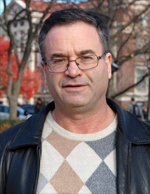People
Sabre Kais
Professor of Chemistry
Contact Information:
E-mail: kais@purdue.edu
Phone: 765-494-5965
Group Page
Education:
Ph.D. 1989, Hebrew University
M.S. 1984, Hebrew University
B.S. 1983, Hebrew University
Research Impact Statement:
The research in our group is mainly devoted to electronic structure and dynamics of atoms, molecules, clusters and quantum dots. The research program includes developing and applying the renormalization group, finite-size scaling and the pivot method to treat the following problems:
(I) Electron Correlation Using the Renormalization Group Approach: We have developed the RG approach to treat electronic structure problems. In this approach states above a certain cutoff are removed from the theory, and the Hamiltonian is modified to produce the same results for all physical measurements that involve the remaining modes.
The method is general and has potential applicability for molecular systems.
(II) Quantum Phase Transitions and Critical Phenomena: We have established an analogy between symmetry breaking of electronic structure configurations and quantum phase transitions. Furthermore we have developed the finite size scaling method for quantum systems. In this case, the finite size corresponds not to the spatial dimension but to the number of elements in a complete basis set used to expand the exact wave function of a given Hamiltonian.
(III) Solution of the Self-Consistent field Equations: We have developed a new optimization algorithm, the pivot method. The method quickly converges, does not require derivatives and is resistant to becoming trapped in local minima. We proposed to adopt the pivot algorithm for the solution of differential equations such as the self-consistent field equations.
(IV) Quantum Information and Computation: The main thrust of this project is calculating entanglement for one- and two-dimensional spin systems, atoms, molecules and arrays of quantum dots and relating it to decoherence time, which is a quantity measurable in experiments and of relevance in various proposals for traditional and quantum computer hardware. NSF CCI Center

